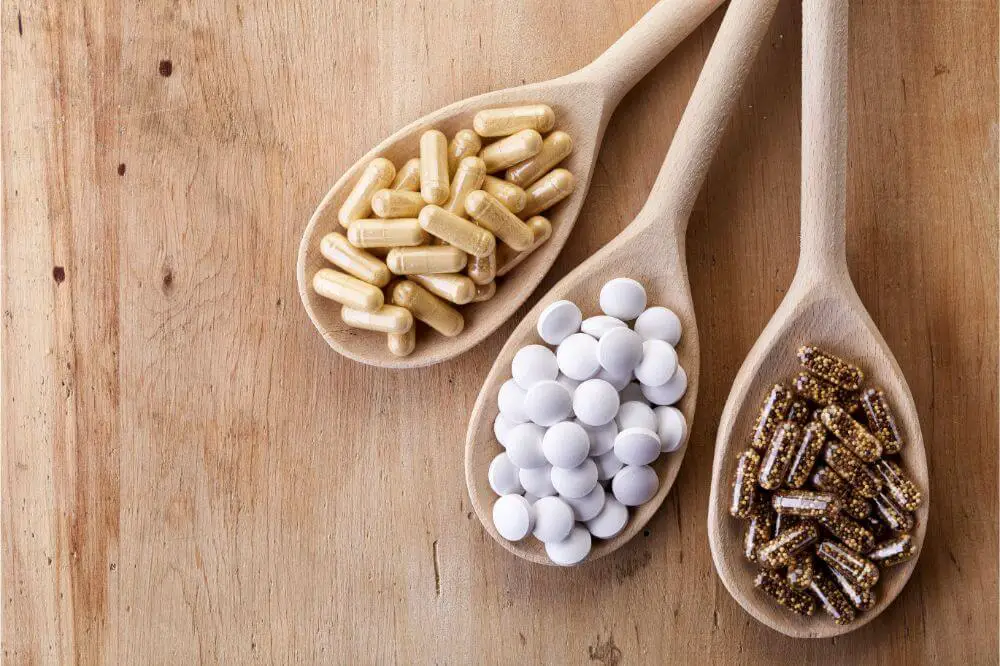As a BetterHelp affiliate, we receive compensation from BetterHelp if you purchase products or services through the links provided
If you want to get the most complete nutrition possible, you may be looking at various vitamins and supplements.
Supplements can boost your health and have a wide range of benefits, but the terminology can get confusing. Some are sold as ‘vitamins,’ some as ‘supplements,’ and some as ‘vitamin supplements.’
So what’s the difference between supplements vs. vitamins, and does it matter?
What is a Supplement?
A ‘supplement’ is a broad range of pills, powders, tablets, or liquids that supply nutrients in more significant quantities than you get in your daily life.
In other words, if you’ve heard about the benefits of fish oil, you might try eating oily fish more often or choose a fish oil ‘supplement’ to get more fish oil than you do from your daily diet.
Likewise, if you want to get more vitamin D than your body naturally makes when exposed to sunlight, you might take a vitamin D ‘supplement’ to get more of that vitamin.
Supplements may be vitamins or minerals, or they may be other nutritional compounds entirely. Some of the most popular supplements around the world include:
- Magnesium
- Protein
- Iron
- Calcium
- Vitamin D
- Vitamin C
- Omega-3 fatty acids
- Folate
- Aloe Vera
- Ginger
- Dietary Fiber
- Creatine
- Vitamin E
Also, many supplements don’t contain just a single ingredient. A supplement may include a wide range of vitamins and minerals, herbs and botanicals, or other ingredients in a single pill or tablet.
These kinds of mixtures may be called ‘multivitamins,’ ‘pre-workout supplements,’ ‘probiotic supplements,’ and more.
What is a Vitamin?
A vitamin is an organic compound that is an essential nutrient for life and health. A vitamin is a specific nutrient type, so other essential nutrients like minerals, amino acids, and fatty acids aren’t classified as vitamins.
Most people get most of their essential vitamins from foods and from eating fruits and vegetables high in vitamins. However, if you worry that your diet doesn’t contain enough essential vitamins, you may want to choose a vitamin pill, tablet, or liquid to get more vitamins. The most popular vitamin supplements are:
- Multivitamins
- Vitamin D
- Vitamin C
- Vitamin B-complex
- Vitamin E
Supplements vs. Vitamins
Any vitamin pill, tablet, or gummy may be a ‘supplement,’ but not all supplements are ‘vitamins.’ As you can see, almost any tablet you take that enhances your diet’s nutrition is considered a ‘supplement’- but only some supplements are specific vitamins.

Are Supplements Necessary?
In many cases, if you are evaluating your diet and noticing that it’s low in riboflavin, for example, you may wonder if it’s worth getting a bottle of supplements to make your nutrition more complete.
If you get less than 100% of your USRDA of some nutrients, do you need a supplement? When considering whether you need dietary supplements, here are the most important things to consider:
Nutrition Works Synergistically
Almost all nutrients your body uses require complementary and interactive nutrients to be effective. In other words, you need vitamin D to process calcium and vitamin C to synthesize collagen. Magnesium is necessary to metabolize both calcium and potassium, and so on.
In most cases, taking a supplement with a single nutrient doesn’t help your body much because it requires complex interactions between various vitamins, minerals, acids, and other compounds to function correctly. Health needs all these nutrients working together all the time.
Food is Always the Best Source of Nutrition
Physicians and nutritionists always recommend relying on a healthy diet full of diverse fruits and vegetables for optimal health. Foods contain a wide range of nutrient compounds that interact and work together for health.
Healthy foods are full of vitamins, minerals, proteins, and healthy fats you need to survive. They also contain various trace minerals and other micronutrients that help the body, so food optimizes nutrition’s synergistic effect. The other reason is that food is the best delivery mechanism for nutrients, ensuring that they are bioavailable.
Some nutrients are fat-soluble, some are water-soluble, some take a long time for the body to process, and some take a short time.
Many individual nutrients aren’t very stable or bioavailable in pills and tablets and can break down quickly if exposed to light, heat, or air. When nutrients are inside the food, they are simplest for your body to metabolize.
Conclusion
Vitamin tablets and supplements can be a great way to ensure that your diet is nutritionally complete, but they don’t take the place of healthy meals.
A diet rich in fresh and colorful fruits and vegetables, lean meats, and healthy fats gives most people all the nutrition they need to live and thrive.
- Stress Management: What is the Relationship Between Stress and Addiction? - June 28, 2024
- Exploring Techniques to Maintain a Healthy Lifestyle without Drugs - May 28, 2024
- How Acupuncture Helps Treat Chronic Fatigue Syndrome - May 28, 2024
This site contains affiliate links to products. We will receive a commission for purchases made through these links.




